 Petzlover
Petzlover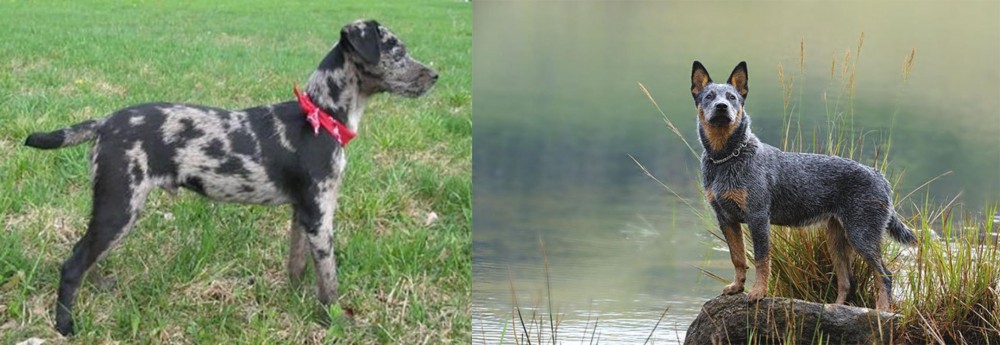 Atlas Terrier is originated from United States but Blue Healer is originated from Australia. Atlas Terrier may grow 23 cm / 9 inches shorter than Blue Healer. Atlas Terrier may weigh 16 kg / 35 pounds lesser than Blue Healer. Both Atlas Terrier and Blue Healer has almost same life span. Both Atlas Terrier and Blue Healer has almost same litter size. Atlas Terrier requires Moderate Maintenance. But Blue Healer requires Low Maintenance
Atlas Terrier is originated from United States but Blue Healer is originated from Australia. Atlas Terrier may grow 23 cm / 9 inches shorter than Blue Healer. Atlas Terrier may weigh 16 kg / 35 pounds lesser than Blue Healer. Both Atlas Terrier and Blue Healer has almost same life span. Both Atlas Terrier and Blue Healer has almost same litter size. Atlas Terrier requires Moderate Maintenance. But Blue Healer requires Low Maintenance
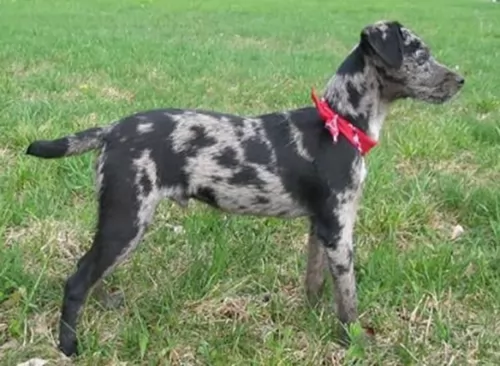 The Atlas Terrier is a rare dog. He was developed in the USA and is a blend of Jack Russell Terriers, Rat Terriers, Border Terriers and Patterdale Terriers. It was in 1990 that Lauren Wolfe developed a breed similar to the Jack Russell, but with a solid colour, and in fact she had two dogs that were solid red in colour. This was as a result of a cross between a Jack Russell Terrier and a Border Terrier.
The Atlas Terrier is a rare dog. He was developed in the USA and is a blend of Jack Russell Terriers, Rat Terriers, Border Terriers and Patterdale Terriers. It was in 1990 that Lauren Wolfe developed a breed similar to the Jack Russell, but with a solid colour, and in fact she had two dogs that were solid red in colour. This was as a result of a cross between a Jack Russell Terrier and a Border Terrier.
With the crossing of different terriers, the foundation for the Atlas Terrier was formed. Lauren Wolfe named the breed ‘Atlas Terrier’ because many terriers from various parts of the world were used to develop this specific breed. It was in 2001 that the Atlas Terrier Association was founded.
 It was in 1802 that George Hall arrived in New South Wales, establishing 2 cattle stations. He had a problem – getting his thousands of cattle to the Sydney markets. He began looking at the prospect of a droving dog and imported a number of dogs of which a blue mottled dog emerged.
It was in 1802 that George Hall arrived in New South Wales, establishing 2 cattle stations. He had a problem – getting his thousands of cattle to the Sydney markets. He began looking at the prospect of a droving dog and imported a number of dogs of which a blue mottled dog emerged.
The dogs were crossed with dingoes and by 1840 the Halls Heelers were used by the Halls. However with the death of one of the Halls, their cattle stations went to action and the dogs, the Halls Heelers became available.
The dogs attracted attention, and the term ‘Australian Cattle Dog’ was adopted. The name referred to those dogs coming from Thomas Hall's ‘Heelers’. There have been many arguments about the origin of the breed, but the red or blue offspring known as Hall's Heelers were proven cattle drovers, and with further breeding experiments which included the Australian Kelpie, dingoes and the Dalmation, by 1893, the tough, robust working breed known as the Blue Heeler or the Australian Cattle Dog came about.
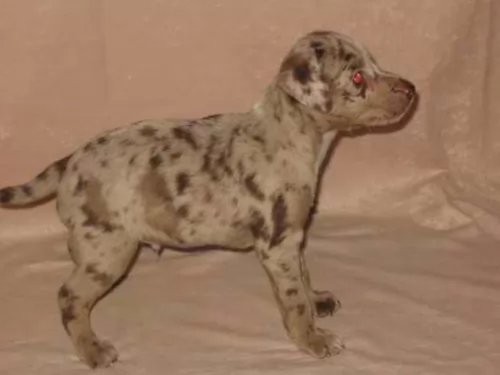 Atlas Terrier dogs are a small to medium sized dog but with a strong personality. With their two coat varieties – smooth and wire – and coming directly from the Jack Russell Terrier, this feisty dog suits those who want a low maintenance, fun breed who will join them on their walks or jogs. These dogs are brave and loyal and will double as a watch dog and family pet.The breed is accepted for registry and it is classified under the Terrier dog category.
Atlas Terrier dogs are a small to medium sized dog but with a strong personality. With their two coat varieties – smooth and wire – and coming directly from the Jack Russell Terrier, this feisty dog suits those who want a low maintenance, fun breed who will join them on their walks or jogs. These dogs are brave and loyal and will double as a watch dog and family pet.The breed is accepted for registry and it is classified under the Terrier dog category.
There are 3 sizes of Atlas Terrier – toy, miniature, and standard. The toy variety is 23 to 28 cm tall at the shoulder and weighs 2.7 to 5.4 kg. All three varieties are the same except for height and weight.
The coat of this dog is thick and may come in a variety of colours such as brindle or merle. The Atlas Terrier is also found in solid colours and sometimes you will find that they have white markings on the face, feet or chest. Most times the tail of the Atlas Terrier is docked, but if not, the tail curls over the back. The ears of the Atlas Terrier are V-shaped and they fold forward.
 Blue Heelers are medium-sized, sturdy, compact dogs who are somewhat longer than tall. The female Blue Heeler measures roughly 43–48cm at the withers, while the male measures about 46–51cm. If your Blue Heeler is in tip top condition, he’ll weigh about 15 to 22 kilograms. They are muscular with pointed, erect ears, dark eyes and long tails which are mostly hanging downwards. Their dense coats are blue- or red speckled and sometimes with tan markings.
Blue Heelers are medium-sized, sturdy, compact dogs who are somewhat longer than tall. The female Blue Heeler measures roughly 43–48cm at the withers, while the male measures about 46–51cm. If your Blue Heeler is in tip top condition, he’ll weigh about 15 to 22 kilograms. They are muscular with pointed, erect ears, dark eyes and long tails which are mostly hanging downwards. Their dense coats are blue- or red speckled and sometimes with tan markings.
The Blue Heeler is a ball of energy and he is clever too. You won’t find him sitting around for too long, and if there is sign of a walk or a ball game, he’s in! He is an independent dog, and although he makes a wonderful family pet, he tends to attach himself to that one special person in his life. He is a natural watchdog and protector of his human family.
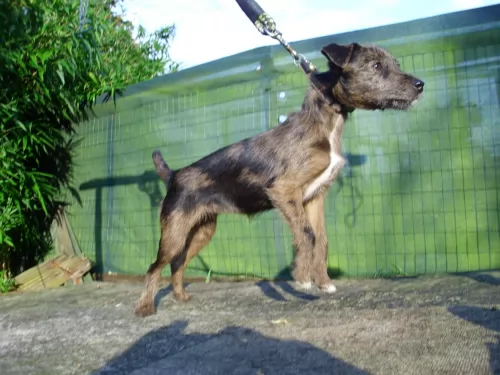 Atlas Terriers most certainly have a bit of the Jack Russell in them and these dogs are social, outgoing, mischievous and affectionate. They’re just like your regular naughty child and having one of them in your home will mean energy and lots of fun and games.
Atlas Terriers most certainly have a bit of the Jack Russell in them and these dogs are social, outgoing, mischievous and affectionate. They’re just like your regular naughty child and having one of them in your home will mean energy and lots of fun and games.
This is a highly social breed and he won’t like to be left alone every day. Just like a human child, he will need to be stimulated to ward off boredom and to prevent him from becoming destructive.
The Atlas Terrier just loves games and if you’re ready for a game, he will be more than ready to take part. He is intelligent and will therefore responds well to training and socialization. When properly socialized, Atlas Terriers get along well with children, and because they’re not an aggressive breed, if they’re properly trained and socialized they will get along with other pets too. Atlas Terriers make excellent pets, but he is a strong willed dog and will require an owner who is firm, but fair.
 Training and socializing of your Blue Heeler will ensure that your dog does what you want him to. The Blue Heeler is an intelligent, responsive dog and training can benefit him, turning him into an outstanding family pet, good with children and other pets in the home.
Training and socializing of your Blue Heeler will ensure that your dog does what you want him to. The Blue Heeler is an intelligent, responsive dog and training can benefit him, turning him into an outstanding family pet, good with children and other pets in the home.
He is a playful, affectionate pet who doesn’t take easily to strangers, and this is what makes him such an excellent guard dog.
Your Blue Heeler is not an apartment dog as he requires a lot of exercise, and cooping him indoors for too long with nothing to do can lead to destructive behavior.
Head-strong, independent and robust, your Blue Heeler will need a firm owner who is boss. Add to the firm owner a lot of love and care, and you’ll have a devoted friend.
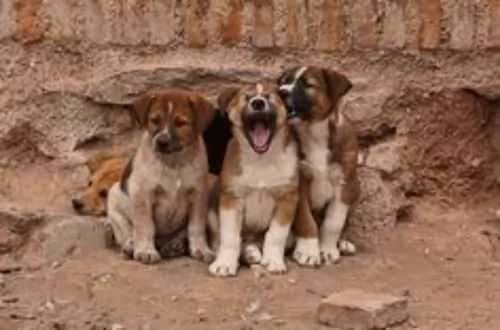 The selective breeding program of Atlas Terriers has meant that this is a robust, spunky breed free of any major health concerns. While they are a low maintenance breed with longevity on their side, you still have to be a responsible pet owner and see that your Atlas Terrier puppy gets all those must have injections.
The selective breeding program of Atlas Terriers has meant that this is a robust, spunky breed free of any major health concerns. While they are a low maintenance breed with longevity on their side, you still have to be a responsible pet owner and see that your Atlas Terrier puppy gets all those must have injections.
Tiny puppies are susceptible to infectious diseases and will have to be vaccinated against them from 8 weeks on and then also get an annual booster. The diseases to be vaccinated against include hepatitis, distemper, parvovirus, coronavirus, eptospirosis and parainfluenza. Vaccinations must be kept up to date and it is mandatory for your puppy to be vaccinated against rabies.
 Australian cattle dogs are healthy and can live up to 15 years of age, but even so there are some genetic conditions that you will need to be aware of following
Australian cattle dogs are healthy and can live up to 15 years of age, but even so there are some genetic conditions that you will need to be aware of following
Eye issues which includes progressive retinal atrophy – this disease is an inherited disease of the retina of the eye where the rod cells are destined to die. Fortunately it is not painful for the dog. There are different types of inherited retinal degenerative diseases in dogs but going into detail with them is beyond the scope of this article. For more information you can chat to your vet.
Recessive piebald elleles - the Blue Heeler has recessive piebald alleles which can produce white in the skin and coat and which is linked to congenital hereditary deafness.
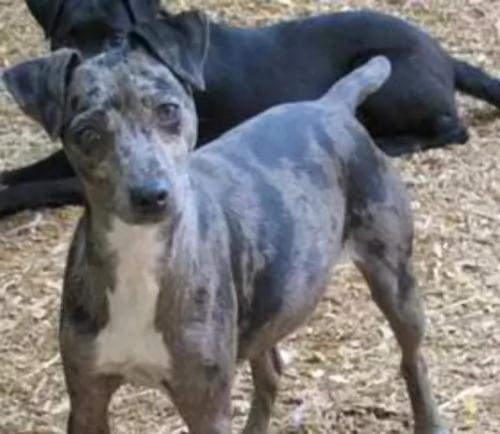 As a medium shedder, the Atlas Terrier will require some grooming. Grooming is easy and a brush twice a week with a rubber-bristled brush will remove those loose hairs and give his coat a sheen.
As a medium shedder, the Atlas Terrier will require some grooming. Grooming is easy and a brush twice a week with a rubber-bristled brush will remove those loose hairs and give his coat a sheen.
Always make sure you’re feeding your tiny puppy the right quantities of a food type. Always feed your puppy food which is appropriate to his age. Your 8 week old puppy will require 4 meals a day. A highly active breed such as the Atlas Terrier will require more protein for energy.
Speak to your veterinarian about the perfect diet for your puppy and about wet- or dry foods. There is the choice of feeding your puppy commercial dog food or your own home-prepared meals, but then you want to be sure that your puppy is getting the right balance of minerals and vitamins.
Once your Atlas Terrier is about a year of age, he can go onto one meal a day or a lighter meal in the morning and the evening. Remember to ensure that there is always clean, cool water available for your puppy.
 Remember that your Blue Heeler was once a full time cattle dog where he used to become totally and utterly exhausted from herding cattle. This is what he loved – the activity. If you have a Blue Heeler, you will need to provide him with plenty of exercise.
Remember that your Blue Heeler was once a full time cattle dog where he used to become totally and utterly exhausted from herding cattle. This is what he loved – the activity. If you have a Blue Heeler, you will need to provide him with plenty of exercise.
If you live on a farm, your Blue Heeler will be in his element because he can run, walk and swim to his heart’s content. If you keep your Blue Heeler in your back garden, you will need to provide him with ball games, rope games, long walks, running on a leash as you cycle and other activities.
Your Blue Heeler has a short, weather-resistant double coat. He’s not a heavy shedder, but he will have his share of seasonal shedding, so it’s a good idea to get into the habit of brushing him at least twice a week. This will get rid of all those loose hairs and keep his skin healthy by getting the blood flowing and distributing his natural oils.
Giving the best dog food for your Blue Heeler will come from either your home made food or a top quality commercially manufactured dog food. He is such a high energy dog, that your veterinarian can advise you on a dog food specially designed for high energy breeds.
These foods are well balanced and are enriched with amino acids and vitamins, promoting healthy bones and joints. Remember to include some raw meat into your dog’s diet and to ensure a constant source of cool, fresh water.
Ensure your Blue Heeler’s ongoing health by paying attention to ears, nails and teeth.